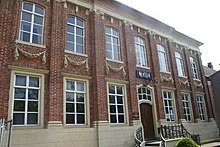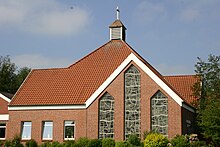Free churches in East Frisia
Free churches have developed a lively ecclesiastical life in East Frisia . Around 7,000 East Frisians are members of an evangelical free church . If the family members and friends not included in most of the free churches are included, then the figure has to be doubled.
overview
The history of the East Frisian free churches goes back to the 16th century. Most of the East Frisian free churches, however, emerged in the 19th and 20th centuries.
Mennonites
The first Mennonite community in East Frisia was established in Emden as early as 1530 . It is considered to be the first North German Anabaptist congregation . Its origin goes back to the reformer Melchior Hofmann , who preached in the Emden church at that time. However, part of this congregation soon distanced themselves from the apocalyptic - chiliastic teachings of Hoffmann, which were held responsible for the catastrophe of the Anabaptist Empire in Münster (1534/1535).
From 1534 the brothers Dirk and Obbe Philips gathered the non-violent Anabaptists around them and founded churches that were legitimized by the New Testament . Around 1536, the former Catholic priest Menno Simons joined the Obbenites named after Obbe Philips. He came from the West Frisian Witmarsum and shaped the young communities through his leadership and organizational talent. Soon the obbenites were called Mennonites . Simon's missionary commitment led to the planting of churches throughout northern Germany and the Netherlands . In addition to the community in Emden, the Mennonite community Leer was established in 1540 and the Mennonite community Norden a good 15 years later . There were also Mennonite-Anabaptist communities in Aurich , Krummhörn , Neustadtgödens and Oldersum . As a result of the pressure of Emperor Charles V , mandates were issued against the Anabaptists in East Friesland, but these were hardly used, especially under Countess Anna of East Friesland , who had accepted the Reformed denomination.
The three East Frisian parishes of this free church belong to the conference of the north-west German Mennonite parishes .
Methodist Church
Methodist Christians have existed in East Frisian since 1809. However, a regular church was not established until 57 years later. This happened when the Methodist preacher Franz Klüsner came to Aurich in 1866 and developed a lively missionary activity there. In Ihlowerfehn , Neuschoo , Dornum and Westeraccumersiel , parishes were established, some of which had their own church buildings . In Esens , between 600 and 700 people gathered in the gym for Methodist worship in the 1870s. Today the work of the United Methodist Church has concentrated on Neuschoo, Aurich, Leer and Wiesmoor .
Baptists / Evangelical Free Churches
The first East Frisian Baptist Congregation (today: Evangelical Free Church Congregation ) was founded in 1846 in your . This congregation becomes the Baptist mission center for East Frisia and the northern Netherlands. Its effect reached through emigrants as far as the USA, where East Frisian Baptist congregations arose and still exist today. Evangelical Free Churches work in the following locations in East Friesland: Aurich - Rahe , Emden, Esens, Hesel-Firrel , Krummhörn-Jennelt , Leer, Moormerland-Veenhusen , Norden , Norderney , Rheiderland-Ditzumerverlaat , Ostrhauderfehn , Südbrookmerland-Moorhusen , Uplengen- Moorhusen , Weener , Westoverledingen-Ihr and Wymeer . Diaconal institutions are located in the north ( family holiday home “tohuus”, book and meeting center “Lütje Hus”), in Weener and Neermoorpolder (kindergarten). The Evangelical Free Churches of East Frisia and Friesland are united in the Ems-Jade Mission .
Free Protestant Congregations (FeG)
The history of the East Frisian Free Evangelical Churches begins in 1949. Free Evangelical Christians from Sweden made the purchase of a children's recreation center on Langeoog possible through a substantial donation . At the same time, congregation work was developed in the north and, a short time later, in Hage , initiated by the Inland Mission of the Free Evangelical Churches. In 1979, after a tent mission in Aurich, another Free Evangelical Congregation was founded , which in 2007 founded the FeG Hesel as a subsidiary congregation .
Independent Evangelical Lutheran Church (SELK)
The East Frisian Evangelical Lutheran Cross Congregation was founded in the Independent Evangelical Lutheran Church (SELK) during the National Socialist era . In the Pentecost sermon in 1934, the then regional church pastor Herkens, who was close to the German Christians, said: “What Paul preached to a community full of Jews, I cannot bring to a community of awakened Germans!” For the farmer Albert Kroon Sr. and his wife and for three other church members this sentence was the triggering moment for a separation from the Evangelical Lutheran national church . They made contact with the Lutheran Free Church in Bremen , and in July of the same year the SELK services were held in the living room of the Kroon family in Hesel-Bagband . A good three years later, the now growing community inaugurated its first church. In the post-war years, a retirement home was founded in Hesel. The new church of the free-church Lutherans, built in 1972, is also located there. This parish and the associated nursing home belong to the Lower Saxony-West church district of the SELK. The SELK sees itself today as an old denominational church and not as a free church.
Evangelical Old Reformed Church (EaK)
In East Friesland there are five Evangelical old reformed parishes , in the Grafschaft Bentheim eight more. Churches can be found in Campen, Emden, Bunde, Ihrhove and Neermor, which were founded in 1854–1861 and have a total of over 1000 members (Bunde: 392, Campen: 230, Ihrhove: 210, Emden: 125, Neermoor: 71). The East Frisian parishes have come together to form the Synodal Association of East Frisia and, together with the Synodal Association of Bentheim, form the Synod of the Evangelical Old Reformed Church with a total of 7,000 members. The Evangelical Reformed Church did not emerge from a revival movement , but is a confessional church that split off from it in the 19th century due to the liberal theology of the predecessor church of the Evangelical Reformed regional church . The structure is synodal-presbyterial, thus emphasizing the relative independence of the local community. The old reformed practice infant baptism. The Lord's Supper is celebrated four times a year. The Heidelberg Catechism continues to play an important role in worship, church teaching and the formation of piety. Two services take place every Sunday, which are mainly characterized by the preaching of the word and the Geneva Psalter .
Federation of Free Church Pentecostal Congregations (BFP)
There are currently around 12 Protestant free churches within the Bund Freikirchlicher Pfingstgemeinden (BFP KdöR) in the East Frisia area. In the past few decades the Pentecostal movement has expanded rapidly around the world. This is why Pentecostal churches are often multicultural. Pastor Klemens Walser in Norden is the head of the BFP region Weser-Ems, which also includes East Friesland.
Brethren Congregations / Darbysten
The Darbysten are represented in East Friesland with meetings in Emden, Wybelsum , Leer, Moormerland - Warsingsfehn and on Borkum. A Christian congregation has recently existed in Pewsum , which emerged from the Brethren congregation Hamswehrum . The congregation in the north was dissolved in 2007 due to a lack of church attendants.
Mülheim Association of Free Church Evangelical Congregations (MV)
The only East Frisian community of this association (MV) is located in Völlenerfehn near Papenburg, near the "border" to the Emsland.
Seventh-day Adventist Free Church
The only Adventist church in East Frisia is located in Neermoor . The Neermoor congregation is the former Adventist congregation Leer, which has since moved from Leer to Neermoor. The municipality of Norden, the beginnings of which could be traced back to the beginning of the 20th century, was dissolved in 2018. The Neermoor community forms a district with the Emsland Advent community of Papenburg and the Nordhorn community .
Independent free church congregations
In East Frisia there are also various free church communities that do not belong to any denominational organization. They are either evangelical or charismatic . These include the two East Frisian Bible communities . They emerged in the 1980s, partly as a split from Evangelical Free Churches. They represent a strongly evangelical doctrine and do not belong to any supra-church organization. They maintain loose contacts with one another. They keep their distance from the Evangelical Alliance and above all from the ecumenical movement . Local parishes are in the north and in Boen near Weener . The community on Mühlenweg and the mission work Christ for you (Meierstrasse, Leer-Loga), which is closely connected to this community , are charismatic . The community on Mühlenweg is a free community that emerged in the 1970s from social diaconal work for people in crisis situations and has grown steadily to this day.
The Philadelphia Community on Norder Schulstrasse is also charismatic . It was created in the 1990s and is based in a former tile specialist shop. Initially, the free church was called the community on the way .
A congregation of so-called Advent Christians is located in Aurich. She went out in 1998, founded in Aurich and 2011 excluded from the Adventist National Association Niedersachsen Adventism forth.
literature
- Menno Smid : East Frisian Church History (= East Frisia in the protection of the dike. Contributions to the culture and economic history of the East Frisian coastal country. Vol. 6). Dike Krummhörn et al., Pewsum 1974.
- Gregor Helms: The free churches - only an insignificant minority? History and work of the free churches in East Frisia and Friesland. In: Ostfreesland. Calendar for East Frisia. Vol. 73, 1990, ZDB -ID 531980-8 , pp. 130-136.
swell
- ^ Cornelius Krahn: Oldersum (Lower Saxony, Germany) . In: Global Anabaptist Mennonite Encyclopedia Online
- ↑ As of December 31, 2007. See Der Grenzbote . No. 2, Volume 118, January 27, 2008, online at the official homepage (accessed on September 15, 2008)
- ↑ Gerrit Jan Beuker: Reversal and Renewal: From the History of the Evangelical Old Reformed Church in Lower Saxony 1838–1988 . Ed. Synod of the EAK. A. Hellendoorn, Bad Bentheim 1988, ISBN 3-929013-04-5 .
- ↑ Homepage of the community on Mühlenweg : About us ; accessed on October 3, 2011
- ↑ Philadelphia Community home page : Welcome ; accessed on October 3, 2011
- ↑ Homepage of the Advent Christians : Advent Christians Aurich ; accessed on October 3, 2011
- ↑ archiv-heinze.de: Gansewendt takes office as pastor ; accessed on September 9, 2012
- ^ Homepage of the STA: Free Church elects state executive in Lower Saxony and in the state of Bremen ; accessed on October 3, 2011






